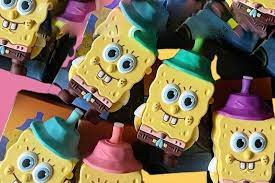
Today the FDA issued warning letters to 15 companies for selling or distributing Chinese novelty vapes resembling well-known characters or non-vaping products. The agency claims the products are designed to appeal to kids.
“These new warning letters mark another step in the FDA’s continued efforts to remove illegal e-cigarettes from the market, particularly those that appeal to youth,” said the FDA press release.
“Since the appearance of these illegal products can be deceiving,” the press release said, “the agency is also seeking to raise awareness among parents, teachers, and other adults headed into the new school year.”
Of course, no parent or teacher is likely to mistake a small handheld disposable vape shaped like a Starbucks cup for an actual Starbucks drink. The point of the press release is to convince FDA watchers in tobacco control and public health organizations that the agency is on the job—alert to the tricks of the sneaky vape industry and prepared to enforce against shameless youth-directed marketing.
Today’s warnings went to companies engaged in online sales and distribution of vapes resembling cartoon characters, video games, a camera, popular drinks, and highlighter pens. None of the products existed before Aug. 8, 2016, meaning they must submit a premarket tobacco application (PMTA) and receive FDA authorization before they can legally be sold. They are clearly illegal, but account for a tiny share of the vape market.
This is a tactic the FDA employs occasionally in an attempt to pump up supposed public outrage (and sympathy for the FDA) over supposedly kid-targeted vape products. But if the FDA seriously believes these novelty vapes are a danger to youth, it would do something more than mark its calendar to issue warning letters every two years.
In April 2020, the agency sent warning letters to nine retailers and manufacturers, citing them for products that included wristwatch and fidget spinner vapes and a vape that resembled a Nintendo Game Boy. More than two years later, in another round of warning letters, the FDA cited the same Chinese manufacturer for the same Game Boy-lookalike product.
Today’s action is another example of the FDA’s lazy, Google-search enforcement strategy. If the companies cited today didn’t have a web presence, they would likely be ignored altogether by the FDA.
Recipients have 15 working days to reply to an FDA warning letter, describing what corrective actions they’ve taken or disputing the agency’s allegations. Those who don’t reply or comply with the warning may face additional FDA sanctions, assuming the agency follows up at all.
